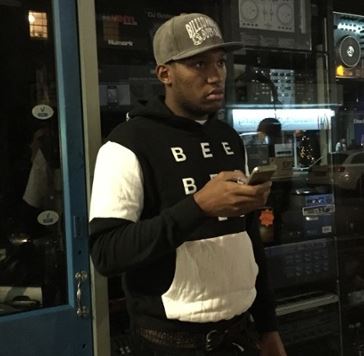
The pioneer of purple lost his way when he signed to 4AD, but now he’s back with The Mainframe, an album designed to recreate the feeling of being a synth- and car-loving 17-year-old.
Liam McLean is at his home studio in Bristol, bashing out some chords. The studio is actually his mum’s spare room, but McLean – better known as Joker – has appropriated it for the purposes of music. It also works well as a place to stash his sizeable collection of synthesisers (I count seven in use, two behind the door, and three more in the corridor). His mum’s OK with it, apparently, even though her son has his own flat on the other side of the street. He’s happy, too, because his mum’s very good at dealing with the neighbours when they complain about the noise.
Anyone who has heard Joker’s music will know it’s not the soundtrack to suburban tranquility. McLean, who is 26, has been making music for more than a decade. He started off in grime, before moving into a more expansive sound that was sometimes described as dubstep but was known by aficionados as “purple”. It matched slow, lurching percussion and vivid, blaring hooks with bass that reached out from the speakers to thump you in the solar plexus. Whatever you called it, it was pretty loud.
Now McLean is on his Korg Triton, trying to find the source of Wiley’s fabled eskisound. “It sounds better on the Triton,” he says as he tries more chords. “It’s just a square wave but the second you hear it you think of Wiley.” I ask, stupidly, what a square wave is. “It’s basically a soundwave with the highs and the lows squared off,” he says, gesturing at a graphic on Google images. “That’s what we call grime.”
Joker likes “old music” (he means the mid-00s) and one of the reasons is because it was made by hardware, not software; by big synths rather than small plug-ins on sophisticated computer programs. “Back then everything was hardware and these things had a sound to them, a very thick, crispy sound. Everything had a class to it. I believe that’s why people like old music.”
Advertisement
He thinks for a minute and then asks in his distinct west country accent: “You into cars?” I answer that I have a bike. “Now I’m a car enthusiast, but I don’t mind Tiptronic. Do you know what that is?” Yes, I guess (it’s the bespoke automatic transmission developed by Porsche). “Big car enthusiasts don’t like Tiptronic though, they love manual gearsticks. Hardware and software is like manual gearstick vs automatic Tiptronic. It’s not like one is better, but people have their preference. You know what I mean?”
For someone who makes such futuristic sounding music, McLean is touchingly nostalgic, even if it’s for the past of just seven or eight years ago. That sense doesn’t just influence the way he creates, but the music itself. His formative years were spent hanging around studios in Bristol, picking up tips from local luminaries like drum’n’bass innovator Roni Size. With whatever money he could scrape together, he would visit secondhand shops and look for discarded equipment. The first synthesiser he bought was a Yamaha DX27. “It was £60 and I bought it because every time I heard the sounds they were triggering something in my brain. I remember playing it and thinking: why does this sound so shit, but so nice? I went home and did some research and I realised that Yamaha created the chips inside the Sega Mega Drive and that they were essentially the same chips as in the keyboard. So basically all the sounds that made Sonic the Hedgehog were on the DX27 too. Mind. Was. Blown.”
The Mega Drive connection helps to explain the energetic rush behind Joker’s music. Tracks that I had previously thought were conceived as if from an imagined future, were actually coming (like so much music before it) from a reconstituted past. The cheery backdrop to Sonic and Crash Bandicoot becoming the inspiration for the glistening melodies on songs like Purple City and Midnight that act as a counterpoint to eviscerating blasts of bass.
There’s something of the big kid about McLean. He’s passionate and enthusiastic, and likes to joke around. He’s constantly pulling goofy faces (some of the looks are straight rips from The Fresh Prince of Bel Air, but he wears them well). He loves fast food. He also seems at ease with himself though, despite the fact that the last few years of his career have proven difficult. After “purple” had earned him a reputation as a distinctive producer, he signed to indie label 4AD to make his first artist album. What emerged was The Vision, a 2013 collection that turned away from the sound that had made his name and instead served up a style of pop music that was full of guest vocals and seemed to fit neither in the club nor on mainstream radio. The album got universally disappointing (and disappointed) reviews and quickly disappeared, as did McLean’s relationship with 4AD.
McLean says that he could have felt “freer” when making The Vision, but that the music was still true to himself. “I guess from the outset people think they know you. They’d probably be surprised that I like R&B or Ellie Goulding,” he says. But his new album, The Mainframe, is noticeably more club-oriented, more bassy, more purple. “I’d got a bit lost. I took a few steps back, trying to get back to 17-year-old me, just being free and making what I want to make. This album is more of a sexy grimy, cinematic thing.”
It’s also self-released, with McLean having put up his own money to get the album promoted. That has not left him flush with cash but has perhaps helped in trying to build that connection with his 17-year-old self, the synthesiser obsessive. Every day he’s in his mum’s flat making music and at a rate he hasn’t managed for years (“For the past two months I’ve been checking my new folder and it’s got, like, 90 ideas in it”). He’s also disarmingly frank about how he sustains himself while doing this. “Without wanting to seem bad, I think that we live in England and if you really want to make music, sign on,” he says. “Sign on until you can start making money from your music and start paying tax. I know some people say, ‘Well, you should get a job,’ but I’m like, cool, I get what you’re saying, but if you need money then you’re not into music that much. Most people’s mums are still around. Not a lot of people’s mums are going to turn you away from the house. If you want to make music go and live at mum’s! I prefer that to making money. We’re all just going to die anyway.”
On that unusually morbid note, we go back to hunting the sounds of old (this time the signature early Neptunes tones). Whether this album succeeds or not it seems Joker will continue to contribute taxes for a while yet. The renascent grime scenehas meant he is in constant demand as a DJ, as well as to produce other people’s music. He plays me a beat he’s made for the much-anticipated LP by Skepta. It’s strong and it strikes me that, free from the pressure of having his name on the music, Joker’s skills might have the best chance of thriving.
When it comes time for me to head back to the station, McLean heads out in his silver BMW (besides the synths, his one pop-star possession). As he performs drifts on Bristol’s outer ring road, a new track of his – a production for the singerZak Abel – is premiered on Mistajam’s 1Xtra show. It feels like a proper pop-star moment, but it brushes right off McLean’s shoulder. He’s more hyped about the fact his mates are coming out to play with him at a small club that night. It’s the attitude of an enthusiast, a music lover and you think that, whatever happens, this Joker will keep smiling.
Source: Guardian




Be the first to comment